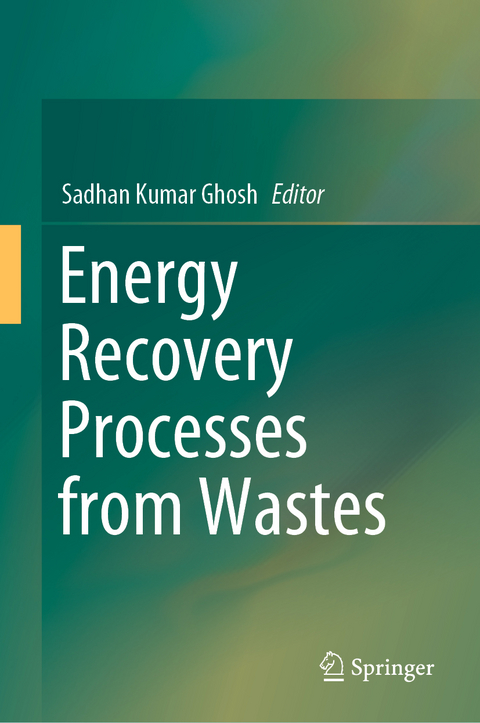
Energy Recovery Processes from Wastes
Springer Verlag, Singapore
978-981-329-227-7 (ISBN)
Dr. Sadhan Kumar Ghosh is a Professor & Former Head of the Mechanical Engineering Department and the Founder Coordinator of the Centre for QMS at Jadavpur University, India. He is a prominent figure in the fields of waste management, circular economy, SME sustainability, green manufacturing, green factories, TQM and ISO standards. He served as the Director, CBWE, Ministry of Labour and Employment, Government of India and L&T Ltd. Prof Ghosh is the Founder and Chairman of the IconSWM and the President of the International Society of Waste Management, Air and Water, as well the Chairman of the “Indian Congress on Quality, Environment, Energy and Safety Management Systems (ICQESMS)” and the “Consortium of Researchers in International Collaboration” (CRIC). In 2012, he was awarded a Distinguished Visiting Fellowship by the Royal Academy of Engineering, UK, to work on “Energy Recovery from Municipal Solid Waste”. He received the Boston Pledge and NABC 2006 award for the most eco-friendlyinnovation “Conversion of plastics & jute waste to wealth” in Houston, USA. He received patents on a waste plastic processing technology and a high-speed jute ribboning technology for preventing water wastage & occupational health hazards. He has published more than 50 research papers in leading international refereed journals and edited more than 30 books and proceedings. He is the Associate Editor of Journal of Japan Society of Materials Cycles and Waste Management. He has accomplished and has been involved in several impactful interdisciplinary research projects on sustainable supply chain of small- and medium-sized enterprises (SMEs) across the globe, circular economy in 34 countries, waste to energy and waste management. His projects have been funded by British Council, Royal Society, Royal Academy of Engineering, EU Horizon 2020, Jute Technology Mission, Central Pollution Control Board, Government of India, UNCRD/DESA, APO and Shota Rustaveli National Science Foundation (SRNSF)of Georgia.
Chapter 1. 3-Stage Reactor Design to Convert MSW to Methanol.- Chapter 2. PCDD/PCDFs: A Burden From Hospital Waste Disposal Plant; Plasma Arc Gasification Is the Ultimate Solution for Its Mitigation.- Chapter 3. Catalytic and Non Catalytic Thermolysis of Waste Polystyrene for Recovery of Fuel Grade Products and their Characterization.- Chapter 4. Energy Recovery from Tyre Waste Pyrolysis: Product Yield Analysis and Characterization.- Chapter 5. Solid State Gas Fermenter to Convert Syn-Gas to Methanen.- Chapter 6. Conceptual approach of a Solar Thermal Steam Generator and its Design & Optimization.- Chapter 7. Generation of Energy from Waste Management.- Chapter 8. Influence of Pyrogallol (PY) Antioxidant in the Fuel Stability of Alexandrian Laurel Biodiesel.- Chapter 9. Investigation on Engine Characteristics Powered with Waste HDPE Oil Obtained from Catalytic Pyrolysis and Study on NOx Emission Variation using Thermal Imager.- Chapter 10. Application of Artificial Intelligence to Predict the Engine Performance and Emission Paradigm Fuelled with Diesel-Biodiesel Blends.- Chapter 11. Comparative Analysis of Experimental and Simulated Performance and Emissions of Compression Ignition Engine Using Biodiesel Blends.- Chapter 12. Modelling and Simulation of Biodiesel from Various Feed Stocks into Compression Ignition Engine.- Chapter 13. Sesame Stalk as a Feedstock for Thermo-chemical Conversion: Products Distribution and Characterization.- Chapter 14. Temperature Influence on Quality and Yield of Pyrolytic Products of Seedcake of KayeaAssamica.- Chapter 15. Recycling Industrial Waste for Production of Bioethanol.
| Erscheinungsdatum | 27.09.2019 |
|---|---|
| Zusatzinfo | 78 Illustrations, color; 21 Illustrations, black and white; XVI, 250 p. 99 illus., 78 illus. in color. |
| Verlagsort | Singapore |
| Sprache | englisch |
| Maße | 155 x 235 mm |
| Themenwelt | Naturwissenschaften ► Biologie ► Ökologie / Naturschutz |
| Technik ► Elektrotechnik / Energietechnik | |
| Technik ► Umwelttechnik / Biotechnologie | |
| ISBN-10 | 981-329-227-X / 981329227X |
| ISBN-13 | 978-981-329-227-7 / 9789813292277 |
| Zustand | Neuware |
| Informationen gemäß Produktsicherheitsverordnung (GPSR) | |
| Haben Sie eine Frage zum Produkt? |
aus dem Bereich


